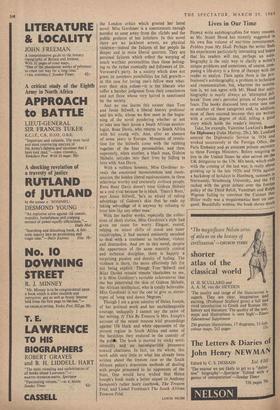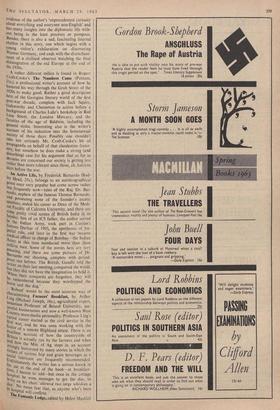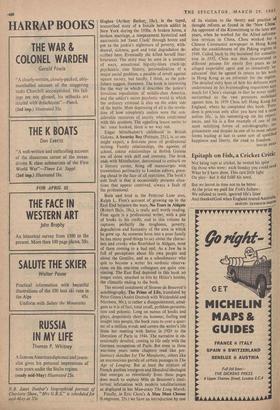Lives in Our Time
PEOPLE write autobiographies for many reasons, as Mr. Stuart Hood has recently suggested In his own fine volume of war-time reminiscence. Pebbles from My Skull. Perhaps the writer finds his experiences particularly interesting and hopes that his readers will too, perhaps an auto- biography is the only way to clarify a writer's unique problems and sometimes, of course, corn' posing a life-story is a form of therapy with the reader as analyst. Then again there is the pro- fessional's autobiography, a problem in technique and communication, but, whatever the motiva- tion is, we can agree with Mr. Hood that auto- biography is nearly always an 'attempted jail- break' from one's personal prison of hopes and fears. The books discussed here come into one or another of these categories and, in addition, most of them succeed because they are written with a certain degree of skill, telling a good story which holds the reader's interest. Take, for example, Valentine Lawford's Bound for Diplomacy (John Murray, 28s.). Mr. Lawford entered the Diplomatic Service in 1934 and worked successively in the Foreign Office, the Paris Embassy and as assistant private secretary to three Foreign Ministers. Before resigning to live in the United States he also served on the UK delegation to the UN. His book, which ends with the coming of the last war, is really about growing up in the late 1920s and 1930s against a backdrop of holidays in Hamburg, summers In Normandy, Strasbourg University, and the FO racked with the great debate over the foreign policy of the Third Reich, Vansittart and Ralph Wigram failing to convince- the Cabinet that Hitler really was a megalomaniac bent on con- quest. Beautifully written, the book shows much THe SPECTATOR, MARCH 29, 1963 evidence of the author's 'unprecedented curiosity about everything and everyone non-English' and has many insights into the diplomatic life with- .out being in the !east precious or pompous. Besides, there is also a sad, fascinating internal rhythm in this story, one which begins with a Young visitor's exhilaration on discovering Weimar Germany, and ends with the disenchant- ment of a civilised observer watching the final disintegration of the old Europe at the end of the 1930s.
A rather different milieu is found in Rupert Croft-Cooke's The Numbers Came (Putnam,
a professional writer's account of how he battered his way through the Grub Street of the 1920s to make good. Rather a good description here of the Georgian literary world of the first Post-war decade, complete with Jack Squire, Galsworthy and Chesterton in action before a background of Charles Lahr's bookshop in Red Lion Street, the London Mercury, and the fatuities of the age of Baldwin, including the general strike. Interesting also is the writer's account of his induction into the homosexual society of those days. Possibly one shouldn't take too seriously Mr. Croft-Cooke's bit of propaganda on behalf of that clandestine fratcr- nitY, but somehow he does make a strong (and disturbing) case for his argument that as far as deviates are concerned our society is getting less rather than more tolerant since those, ah, halcyon days before the war.
,
An Active Life, by Frederick Barnardo (Hod- leY Head, 25s.), belongs to an autobiographical genre once very popular but come across rather less frequently now—tales of the Raj. Dr. Bar- nardo, nephew of the famous Thomas Barnardo, and Possessing none of the founder's ascetic qualities, ended his career as Dean of the Medi- cal Faculty of Calcutta University, and there are some pretty vivid scenes of British India in its neYday. Son of an ICS father, the author served in the Indian Army, took part in Curzon's famous Durbar of 1903, the apotheosis of 1m- Perla' rule, and later in the first war became medical officer in charge of Bombay—the Indian Ar,nlY at this time numbered more than three million men. Some of the stories here arc very amusing, 'and there are some pictures of Dr. Barnardo out shooting, complete with period- Piece sun helmet. The British, Gandhi told the writer on their last meeting, conquered the world, but they did not have the imagination to hold it. , When their conquests are forgotten, they will horse remembered because they worshipped the l °rse and the dog.' 'Robust' would be the most accurate way of characterising Farmers' Breakfast, by Arthur Ling (Michael Joseph, 18s.), agricultural expert,
sometime Professor of Bristol University, sue- eessful businessman and now a well-known West
Country mass-media personality. Professor Ling's
?lied career started in the civil service in the factor war, and he was soon working with the 'actor of a remote Highland estate. There is an
excellent account of- how the countryside of aBritain is actually run by the farmers and when and how the Min. of Ag. steps in, an account strongly buttressed by many stories in which the ;no rtues of various hop and grain beverages as a lubricant are frequently recommended. Unfortunately the writer has a serious knock in .in his car at the end of the book—at breakfast- ,uose, I hasten to add—but once in the cottage hospital he even manages to get the doc. to write on his chart 'allowed two large whiskies a do3'.. No mean feat that, as anyone who's been hospital Will confirm. The Fantastic Lodge, edited by' Helen MacGill
Hughes (Arthur Barker, 18s.), is the taped, transcribed story of a female heroin addict in New York during the 1950s. A broken home, a broken marriage, a temperament hysterical and narcissistic led 'Janet Clark' through booze and pot to the junkie's nightmare of poverty, with- drawal, sickness, gaol and total degradation de- scribed here. Eventually she killed herself (bar- biturates). The story may be seen in a number of ways, sensational big-city-blues crack-up psychiatric case history, personalisation of a major social problem, a parable of revolt against square society, but hardly, I think, as the pub- lishers suggest, literature. The book is interesting for the way in which it describes the junkie's ferocious repudiation of middle-class America, and the addict's secret psychotic world in which the ordinary criminal is also on the other side of the battle. Most depressing of all is the revela- tion of how completely useless were the con- siderable resources of society when confronted with this problem. The appalling lesson seems to be: once hooked, there is no way out.
Edgar Mittelholzer's childhood in British Guiana, A Swarthy Boy (Putnam, 21s.), is, as one might expect, a first-rate piece of professional writing. Family relationships, the agonies of school, colour relationships in British Guiana are all done with skill and intensity. The book ends with Mittelholzer, determined to embark on a literary career, firing off manuscripts with tremendous pertinacity to London editors, press- ing ahead in the face of all rejections. The book's sole fault is that it occasionally presents situa- tions that appear contrived, always a fault of the professional.
Born and bred in the Petticoat Lane area, Ralph L. Finn's account of growing up in the East End between the wars, No Tears in Aldgate (Robert Hale, 18s.), is really well worth reading. Finn again is a professional writer, with a pile of books to his credit, and in this volume he captures perfectly the toughness, poverty, degradation and humanity of the area in which he grew up. As someone born into a poor family he has many good things to say about the charac- ters and crooks who flourished in Aldgate, most of them coming to a bad end. As a Jew he is full of perceptions about his own people and about the Gentiles, and as a schoolmaster who quit to become a writer his sardonic observa- tions on his one-time colleagues are quite con- vincing. The East End depicted in this book no longer exists, smashed to bits by Hitler's bombs, the climactic ending to the book.
The second instalment of Simone de Beauvoir's autobiography, The Prime of Life, translated by Peter Green (Andre Deutsch with Weidenfeld and Nicolson, 30s.), is rather a disappointment, amal- gam as it is of fact, total recall, problem-presenta- tion and polemic. Long on names of books and plays, desperately short on humour, feeling and insight into people, the book runs to over a quar- ter of a million words and covers the writer's life from her meeting with Sartre in 1929 to the liberation of Paris in 1944. The narrative is ob- sessionally detailed, coming to life only with the German occupation of Paris. But even in these war-time years some chapters read like pre- liminary sketches for The Mandarins, others like an unconscious parody of certain passages in The Age of Longing. But at least the mixture of French puritan bourgeois and liberaloid ideologist that emerges so relentlessly from these pages does much to explain Mlle de Beauvoir's intel- lectual infatuation with modern totalitarianism as displayed in her Mao-crazy The Long March.
Finally, in Eric Chou's A Man Must Choose (Longmans, 25s.) we have an introduction by one
of its victims to the theory and practice of thought reform as found in the 'New China. An opponent of the Kuomintang in the later war years, when he worked for the Allied informa- tion services in China, Chou worked for a Chinese Communist newspaper in Hong Kong after the establishment of the Peking regime in 1949. Called back to the mainland for consulta- tion in 1952, Chou was then incarcerated ID different prisons for nearly .five years as an alleged imperialist agent and so intensively 're- educated' that he agreed to return to his Work in Hong Kong as an informer for the regime. The detailed story here of how his defences were undermined by his, brainwashing inquisitors says much for Chou's courage in that he never really succumbed to the vast pressures mobilised against him. In 1959 Chou left Hong Kong for England, where he completed this book. 'Free- dom is precious only after you have led a most unfree life,' is his summing-up on his experi- ences, and his is a fine example of one of the most satisfying forms of autobiography, ,iin" prisonment and despair in one of its most odious forms leading at last to some sort of qualified happiness and liberty, the road to freedom. DAV 113 REES
















































 Previous page
Previous page